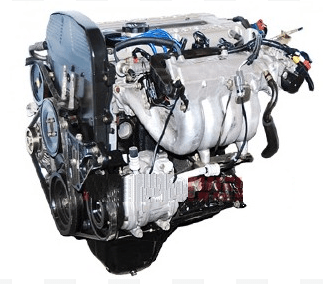Mitsubishi 4G63 2.0L Engine Specs, Problems, Reliability. The 4G63 engine belongs to the Mitsubishi Sirius 4G6 household first of all introduced in 1980. It is the four-cylinder 2.0-liter gasoline naturally aspirated engine (the turbocharged variation is the 4G63T engine). The 4G63 is a heavily customized the G63B engine (a SOHC carbureted eight-valve version installed in various Mitsubishi designs till 1986-88). This engine has a long history and it has actually been utilized in a vast array of applications (in Mitsubishi, Plymouth, Dodge, Eagle and Hyundai lorries). There were many variations with brand-new upgrades and different parts throughout the production.
The 4G63 engine constantly has a cast iron cylinder block. The engine block is equipped with two balance shafts (silent shafts). It likewise had actually created steel crankshaft and linking rods and cast aluminum alloy pistons (some engines had aluminum pistons with steel inserts). Depend upon adjustment, the engine has numerous kinds of aluminum cylinder heads: 8-valve SOHC head, 16-valve SOHC head, and 16-valve DOHC head. All versions use the timing belt to drive the consumption and exhaust camshafts or just single camshaft.
Table of Contents
Mitsubishi 4G63 2.0L Engine Specs, Problems, Reliability
The single camera actuates the intake and exhaust valves via rocker arms and the adjustment of the valve clearances is needed. The cylinder heads with double overhead camshafts provided given that 1987. These engines likewise have rocker arms but with automated hydraulic valve clearance compensation. The intake valve diameter is 33 mm; the exhaust valve size is 29 mm. The all 4G63 engines were equipped with Mitsubishi’s electronically controlled multi-point fuel injection system named as ECI-MULTI. The DOHC engines likewise got the electronic ignition.
The engine has gotten fame thanks to the turbo version 4G63T and various victories of Mitsubishi cars in rally competitions with this 2.0 l turbo engine considering that 1988. Together with 2.0 l variation, the producer produced the big brother – 2.4-liter 4G64 engine. The Mitsubishi has actually stopped the production of the 4G63 and replaced it with the brand-new generation of the 2.0-liter engines – the 4B11 engine. The 4G6 is still being set up by some Chinese car manufacturers in brand-new vehicles today.
4G63 Engine Problems and Reliability
The hydraulic valve lifters are really sensitive to the fuel quality. Not replaced engine oil in time can quickly minimize their longevity to 30-40k miles. The jammed bearings of balance shafts can result in severe engine damages. It’s extremely recommended to keep oil system tidy, utilize good quality engine oil, and check the condition of the belt. Some individuals prefer to get rid of balance shafts totally by setting up a special aftermarket balance shaft eliminator kit.
In general, the 4G63 is referred to as a really reputable engine. The majority of them currently have a huge mileage near 200,000-250,000 miles (300,000-400,000 km). However the engine is simple for repair and rebuild because the OEM and high-performance parts are available and easy to purchase.
you must see more engine detail in here: Engine – US Cars News or you can see on wiki here
Mitsubishi 4G63 2.0L Engine Specs
| Manufacturer | Mitsubishi Motors Engine Manufacturing Co Ltd, Kyoto engine plant Diamond-Star Motors, Normal, Illinois |
| Production years | 1980-present day |
| Cylinder block material | Cast Iron |
| Cylinder head material | Aluminum |
| Fuel type | Gasoline |
| Fuel system | Fuel injection |
| Configuration | Inline |
| Number of cylinders | 4 |
| Valves per cylinder | 2/4 |
| Valvetrain layout | SOHC/DOHC |
| Bore, mm | 85.0 mm (3.35 in) |
| Stroke, mm | 88.0 mm (3.46 in) |
| Displacement, cc | 1,997 cc (121.9 cu in) |
| Type of internal combustion engine | Four-stroke, naturally aspirated |
| Compression Ratio | 9-10.5:1 |
| Power, hp | 109-144 hp (81-107 kW)/5,500-6,500 |
| Torque, lb ft | 117-130 lb-ft (159-176 Nm)/4,500-4,750 |
| Engine weight | 350 lbs (160 kg) |
| Firing order | 1-3-4-2 |
| Engine oil weight | 5W-30, 5W-40, 10W-30, 10W-40 |
| Engine oil capacity, liter | 4.0 (4.2 qt) – 1G; 3.8 (4.0 qt) – 2G |
| Oil change interval, mile | 9,000 (15,000 km) or 12 month |
| Applications | Mitsubishi Eclipse, Mitsubishi Galant, Mitsubishi L200/Triton, Mitsubishi Lancer, Mitsubishi Outlander, Mitsubishi Space Runner/RVR, Mitsubishi Chariot/Nimbus/Space Wagon, Mitsubishi Cordia, Mitsubishi Delica, Mitsubishi Dion, Mitsubishi Starion, Mitsubishi Tredia, Dodge Colt Vista/Eagle Vista Wagon, Eagle Talon/Plymouth Laser and others |
Mitsubishi 4G63 2.0L Engine Modifications
- 4G631 – 133 hp at 6,000 rpm, 130 lb-ft (176 Nm) at 4,750 rpm. This is a 16-valve SOHC engine with compression ratio 10:1. You can discover one of these in Mitsubishi Galant E33, Space Wagon/Chariot/Nimbus.
- 4G632 – a little bit more effective 137 hp variation. It has the exact same specs as the 4G631 engine. Application: Mitsubishi Galant E55.
- 4G633 – 109 hp at 5,500 rpm, 117 lb-ft (159 Nm) at 4,500 rpm. The engine has 8-valve cylinder head with single overhead camshaft and low compression ratio 9:1. Application: Mitsubishi Galant E33, Area Wagon.
- 4G635 – 144 hp at 6,500 rpm, 125 lb-ft (170 Nm) at 5,000 rpm. This is a DOHC 16-valve engine; compression ratio is 9.8:1. Application: Mitsubishi Galant E33, Eclipse.
- 4G636 – 133 hp at 6,000 rpm, 130 lb-ft (176 Nm) at 4,750 rpm. This is also a 16-valve engine however with SOHC head; compression ratio is 10:1. Application: Mitsubishi Galant E33/?? 2?, Chariot/Space Wagon/Nimbus, RVR/Space Runner.
- 4G637 – 135 hp at 5,750 rpm, 130 lb-ft (176 Nm) at 4,500 rpm, DOHC head, 16 valves, compression ratio is 10.5:1.


